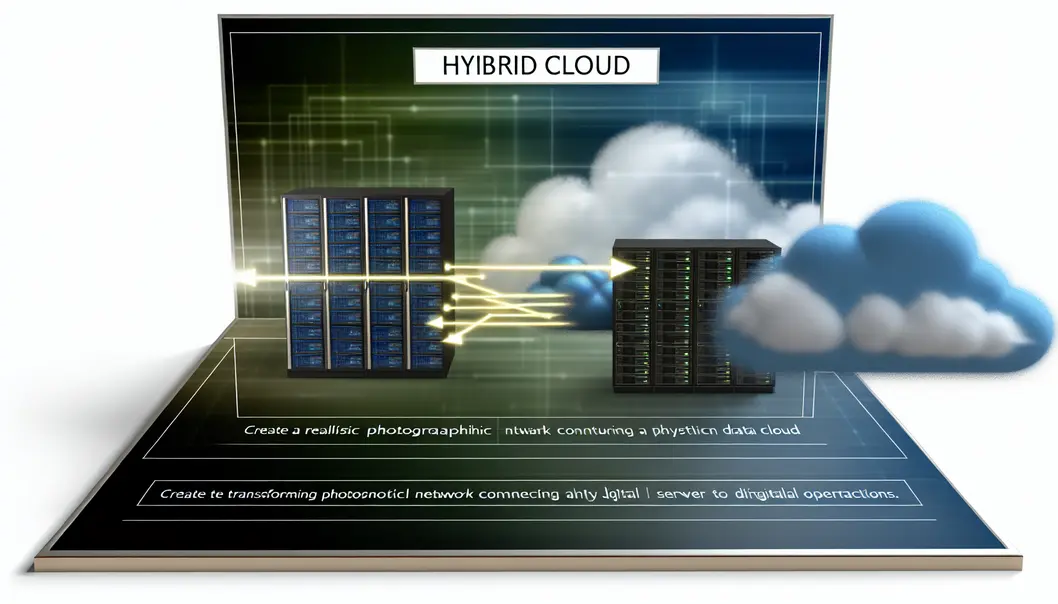Hybrid cloud represents a significant evolution in the way businesses manage their technology operations. Combining the strengths of public and private clouds, this approach provides flexibility, scalability, and security, enabling organizations to achieve new levels of operational efficiency and innovation. As the digital world continues to expand, understanding hybrid cloud becomes essential for any business that wants to remain competitive in the global marketplace.
Understanding Hybrid Cloud: Concepts and Benefits

Hybrid cloud is a solution that combines the advantages of public and private clouds. By allowing data and applications to move between private and public environments, hybrid cloud offers businesses remarkable flexibility. This infrastructure makes it easy to allocate resources according to demand and ensures that sensitive data remains secure in a controlled environment.
To fully understand hybrid cloud, it’s essential to understand how it operates. In hybrid cloud, part of the workload runs in a private cloud, while a less critical part can be directed to a public cloud. This mix not only creates a balance between security and accessibility, but also optimizes resource utilization, often resulting in significant operational cost savings.
One of the main attractions of the hybrid cloud is the ability to scale operations quickly. When a company faces a sudden increase in demand for its services, the public cloud can provide additional capacity without the need for large investments in physical infrastructure. For a deeper dive into cloud scalability, visit this internal resource.
In addition to flexibility and scalability, security is a major benefit of the hybrid cloud. By keeping critical data on private servers and only transferring less sensitive data to the public cloud, companies achieve significant security enhancement. This balance is particularly advantageous for regulated industries, where confidentiality of information is crucial. Furthermore, with modern security and encryption solutions, the likelihood of unauthorized access is minimized.
For many businesses, hybrid cloud represents an evolution in their digital transformation journey. It makes it easier to modernize applications without having to completely overhaul existing IT infrastructure. Effective integration of this technology involves strategic planning to ensure that cloud solutions align with long-term business objectives.
Common hybrid cloud use cases range from software development and testing to backup management and disaster recovery. In these situations, hybrid cloud makes it possible to test new solutions without compromising the main production environment or investing in expensive hardware.
In short, hybrid cloud offers a powerful combination of flexibility, security, and cost savings. Proper implementation not only improves operational efficiency, but also positions businesses to stay ahead in a competitive market where agility and innovation are key. As digital transformation accelerates, adopting hybrid cloud solutions becomes a critical strategy to ensure businesses remain relevant and resilient.
Hybrid Cloud Implementation: Strategies and Challenges

Implementing a successful hybrid cloud strategy starts with a clear understanding of your organization’s specific needs. This requires a detailed analysis of your business processes, data volumes, compliance requirements, and more. This initial assessment helps determine which workloads should remain on-premises, which can migrate to the public cloud, and which require a hybrid approach.
Choosing the right technologies is essential. Organizations should consider platforms that offer seamless integration between public and private cloud environments. They need to be scalable and support multiple languages and development frameworks. The goal is to ensure that the infrastructure can evolve as the business demands grow.
One of the most significant challenges in implementing a hybrid cloud is cost management. Effective governance practices must be in place to monitor and control the use of cloud resources. Advanced analytics tools can be integrated to provide clear visibility into expenses, allowing for quick adjustments as needed.
Security is another critical issue. A comprehensive security approach must be adopted that addresses data protection in both on-premises and cloud environments. This includes advanced encryption, multi-factor authentication, and intrusion detection systems. Implementing consistent security policies across all environments minimizes potential risks.
Data migration is also a significant challenge. Moving significant volumes of data between on-premises and cloud environments can be complex and time-consuming. Detailed migration planning is essential, considering potential disruptions and system compatibility. Using specialized data transfer tools can minimize the impact during migration.
Partnering with experienced providers is key to addressing these challenges. Providers with a proven track record in hybrid cloud can provide not only the necessary infrastructure but also valuable strategic guidance. Their expertise can make it easier to navigate the technical and organizational issues that arise during implementation.
To explore more about cloud infrastructure and storage strategies, visit this article.
Finally, careful preparation before implementation is one of the keys to success. Proper planning, choosing the right technologies, and remaining vigilant about costs and security will ensure that hybrid cloud delivers the expected benefits, transforming operations and creating new opportunities for innovation.
In conclusion
Hybrid cloud is emerging as a driving force in the digital age, offering a unique combination of flexibility, security, and efficiency. By adopting this approach, businesses can not only streamline their operations but also prepare for future technological advancements. With hybrid cloud, the possibilities are endless, as long as organizations are willing to embrace change and adapt to new market demands.
Ready to elevate your business with cutting-edge technology? Contact Quick Commerce today and let our team of experts guide you to success with web solutions!
Learn more: https://quickcommerce.com.br/
Learn a little more about us
Quick Commerce is a company specialized in website creation, website hosting, domain registration, SEO and creation and management of ad campaigns. We are passionate about helping our clients achieve online success through strategic and efficient digital solutions. If you need quality hosting, visit https://qchost.com.br/.


